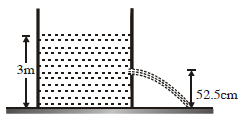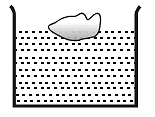The speeds of air-flow on the upper and lower surfaces of a wing of an aeroplane are v1 and v2 respectively. If A is the cross-sectional area of the wing and is the density of air, then the upward lift is :-
1.
2.
3.
4.
If h is the height of capillary rise and r be the radius of capillary tube, then which of the following relation will be correct ?
1. hr = constant
2. h/r2 = constant
3. hr2 = constant
4. h/r = constant
Bernoulli's theorem is based on :
1. conservation of energy
2. conservation of mass
3. conservation of momentum
4. conservation of angular momentum
Two spherical soap bubbles of radii r1 and r2 in vaccum collapse under isothermal condition. The resulting bubble has radius equal to :
1.
2.
3.
4.
The breaking stress of steel is and density is . What should be the maximum length of a steel wire so that it may not break under its own weight :-
1. 5 km
2. 10 km
3. 15 km
4. 20 km
Water is filled in a cylindrical container to a height of 3 m. The ratio of the cross-sectional area of the orifice and the beaker is 0.1. The square of the speed of the liquid coming out from the orifice is (g = 10 m/s2)

1. 50 m2/s2
2. 50.5 m2/s2
3. 51 m2/s2
4. 52 m2/s2
A body floats in a liquid contained in a beaker. The whole system as shown falls freely under gravity. The upthrust on the body due to the liquid is

1. zero
2. Equal to the weight of the liquid displaced
3. Equal to the weight of the body in air
4. Equal to the weight of the immersed portion of the body
A sniper fires a rifle bullet into a gasoline tank making a hole 53.0 m below the surface of gasoline. The tank was sealed at 3.10 atm. The stored gasoline has a density of 660 kgm-3. The velocity with which gasoline begins to shoot out of the hole is
1. 27.8 ms-1
2. 41.0 ms-1
3. 9.6 ms-1
4. 19.7 ms-1
A ball of radius r and density falls freely under gravity through a distance h before entering water. Velocity of ball does not change even on entering water. If viscosity of water is , the value of h is given by

1.
2.
3.
4.
Spherical ball of radius 'r' is falling in a viscous fluid of viscosity '' with a velocity 'v'. The retarding viscous force acting on the spherical ball is
1. Inversely proportional to 'r' but directly proportional to velocity 'v'
2. Directly proportional to both radius 'r' and velocity 'v'
3. Inversely proportional to both radius 'r' and velocity 'v'
4. Directly proportional to 'r' but inversely proportional to 'v'






